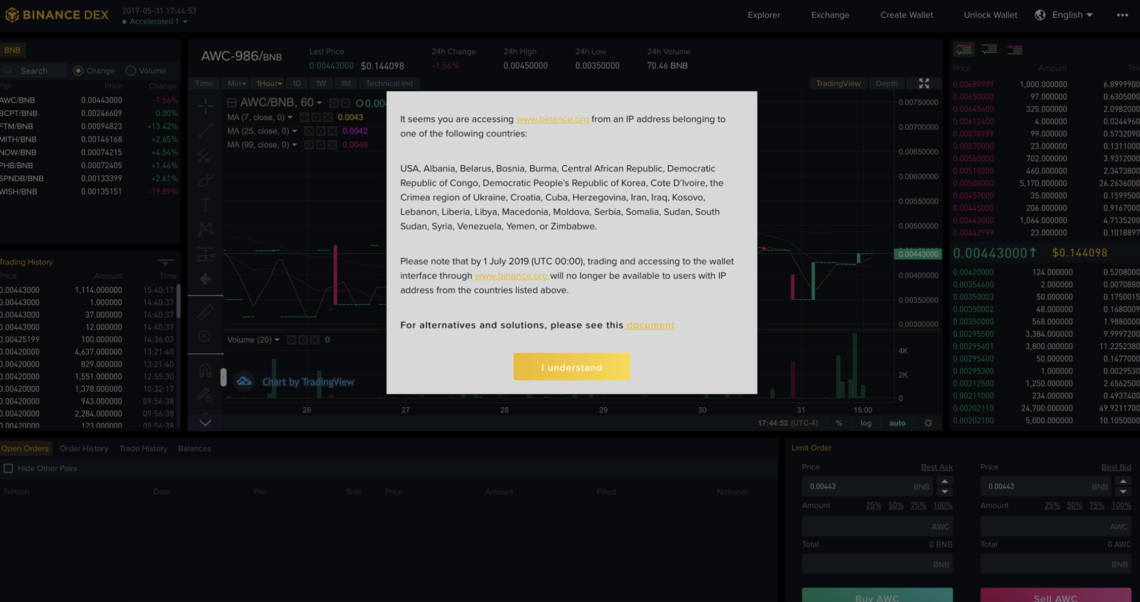According to a warning pop-up on Binance DEX, users from select countries will no longer be able to access its wallet interface starting on July 1.
Americans and other nationalities will soon be unable to use Binance’s new decentralized exchange due to legal complications.
Binance DEX Bans 28 Countries
Users on Binance’s decentralized exchange were surprised to discover a pop-up when visiting the platform today. Starting on July 1, users with certain IP addresses would be blocked from using the exchange’s wallet. The message gives no explanation other than that for these countries, Binance DEX will ‘no longer be available.’ The following countries can expect their IP addresses to be prohibited from using Binance DEX:
The following countries can expect their IP addresses to be prohibited from using Binance DEX:
- USA
- Albania
- Belarus
- Bosnia
- Burma
- Central African Republic
- Democratic Republic of Congo
- Democratic People’s Republic of Korea
- Cote D’Ivoire
- Crimea
- Croatia
- Cuba
- Herzegovina
- Iran
- Iraq
- Kosovo
- Lebanon
- Liberia
- Libya
- Macedonia
- Moldova
- Serbia
- Somalia
- South Sudan
- Syria
- Venezuela
- Yemen
- Zimbabwe

Legal Troubles?
It’s unclear what the legal situation is regarding this IP ban. Most notable of the countries listed is the United States. This is significant because such a large part of Binance’s user base reside in the US. As of now, the pop-up only appears on the Binance DEX landing page and not on the primary Binance exchange page. Because the pop-up is still shrouded in mystery, we can likely expect an official statement from Binance on this notice in the coming days. In 2018, Binance moved its headquarters to Malta after stricter regulations were put in place in both Japan and China. They also have a branch in Jersey called Binance Jersey which offers fiat-to-cryptocurrency pairs including the Euro and British Pound. Will Binance’s primary exchange soon also ban IP addresses from these countries? Let us know your thoughts in the comment below.Disclaimer
In adherence to the Trust Project guidelines, BeInCrypto is committed to unbiased, transparent reporting. This news article aims to provide accurate, timely information. However, readers are advised to verify facts independently and consult with a professional before making any decisions based on this content. Please note that our Terms and Conditions, Privacy Policy, and Disclaimers have been updated.

Advertorial
Advertorial is the universal author name for all the sponsored content provided by BeInCrypto partners. Therefore, these articles, created by third parties for promotional purposes, may not align with BeInCrypto views or opinion. Although we make efforts to verify the credibility of featured projects, these pieces are intended for advertising and should not be regarded as financial advice. Readers are encouraged to conduct independent research (DYOR) and exercise caution. Decisions based on...
Advertorial is the universal author name for all the sponsored content provided by BeInCrypto partners. Therefore, these articles, created by third parties for promotional purposes, may not align with BeInCrypto views or opinion. Although we make efforts to verify the credibility of featured projects, these pieces are intended for advertising and should not be regarded as financial advice. Readers are encouraged to conduct independent research (DYOR) and exercise caution. Decisions based on...
READ FULL BIO
Sponsored
Sponsored

